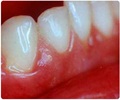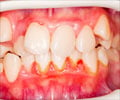A new study reveals that statins are also effective in reducing inflammation caused by gum disease.

In the double-blind, randomized study, patients with heart disease or a high heart disease risk were assigned to take either an 80 mg statin or a 10 mg statin daily for 12 weeks. PET/CT scans were collected after four and 12 weeks and compared to scans taken before treatment began. The 59 patients included in the final analysis showed a significant reduction in gum inflammation after as few as four weeks of treatment with the high-dose statin. Interestingly, the improvement in gum inflammation tracked closely with improvement in atherosclerotic disease.
The study authors concluded that the research provides further evidence of a link between periodontal disease and atherosclerosis and demonstrates that treatments aimed at reducing inflammation in one of these conditions may produce improvements for the other. The authors also raise the possibility that improved oral hygiene to reduce inflammation of the gums may lead to reduced inflammation of the arteries.
"Statins have beneficial effects beyond their lipid lowering properties," Tawakol said. "Physicians should take this into consideration when discussing antihyperlipidemic treatment options with their patients."
Tawakol added that patients with heart disease and stroke should inform their physicians about any significant gum disease and should be particularly careful to follow existing guidelines for tending to gum disease.
Advertisement















